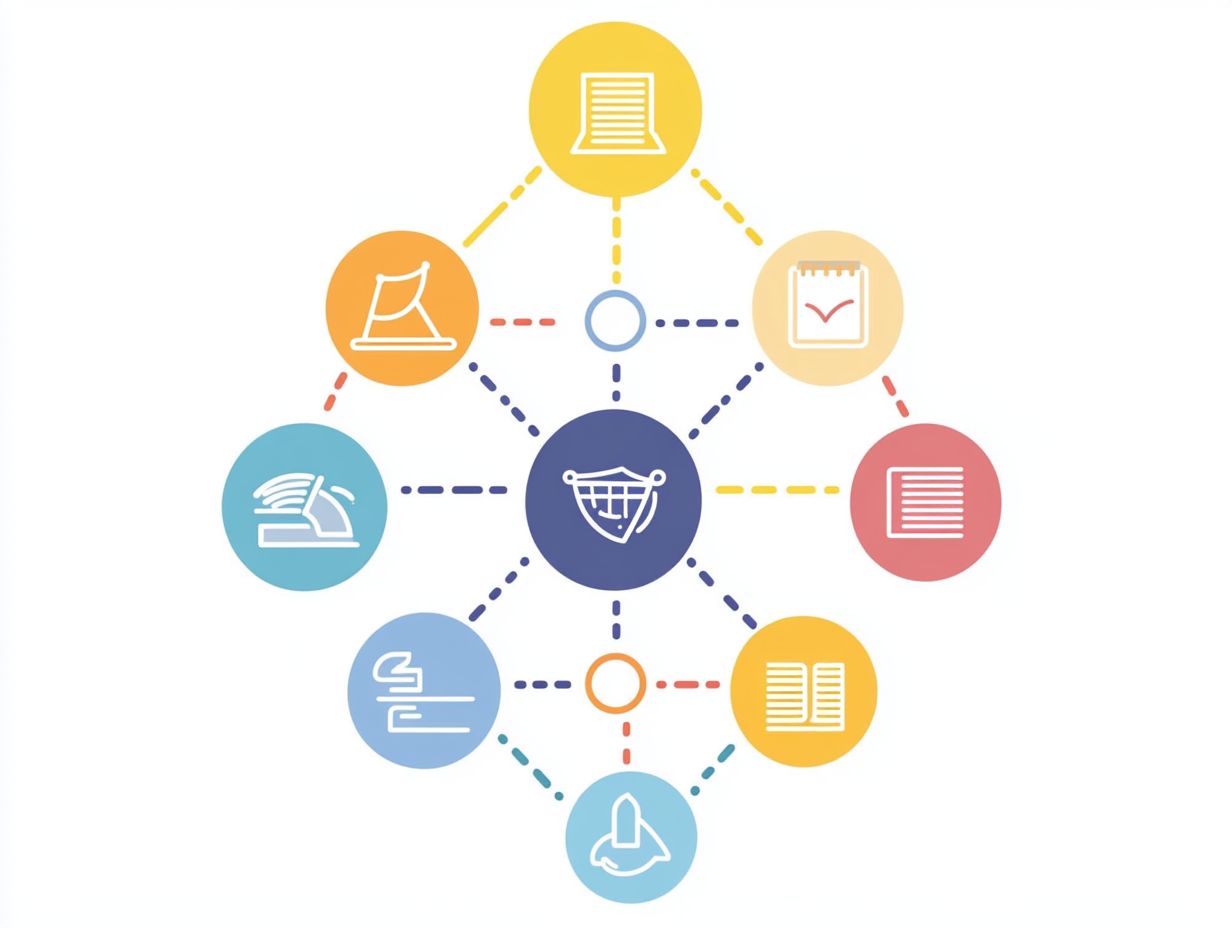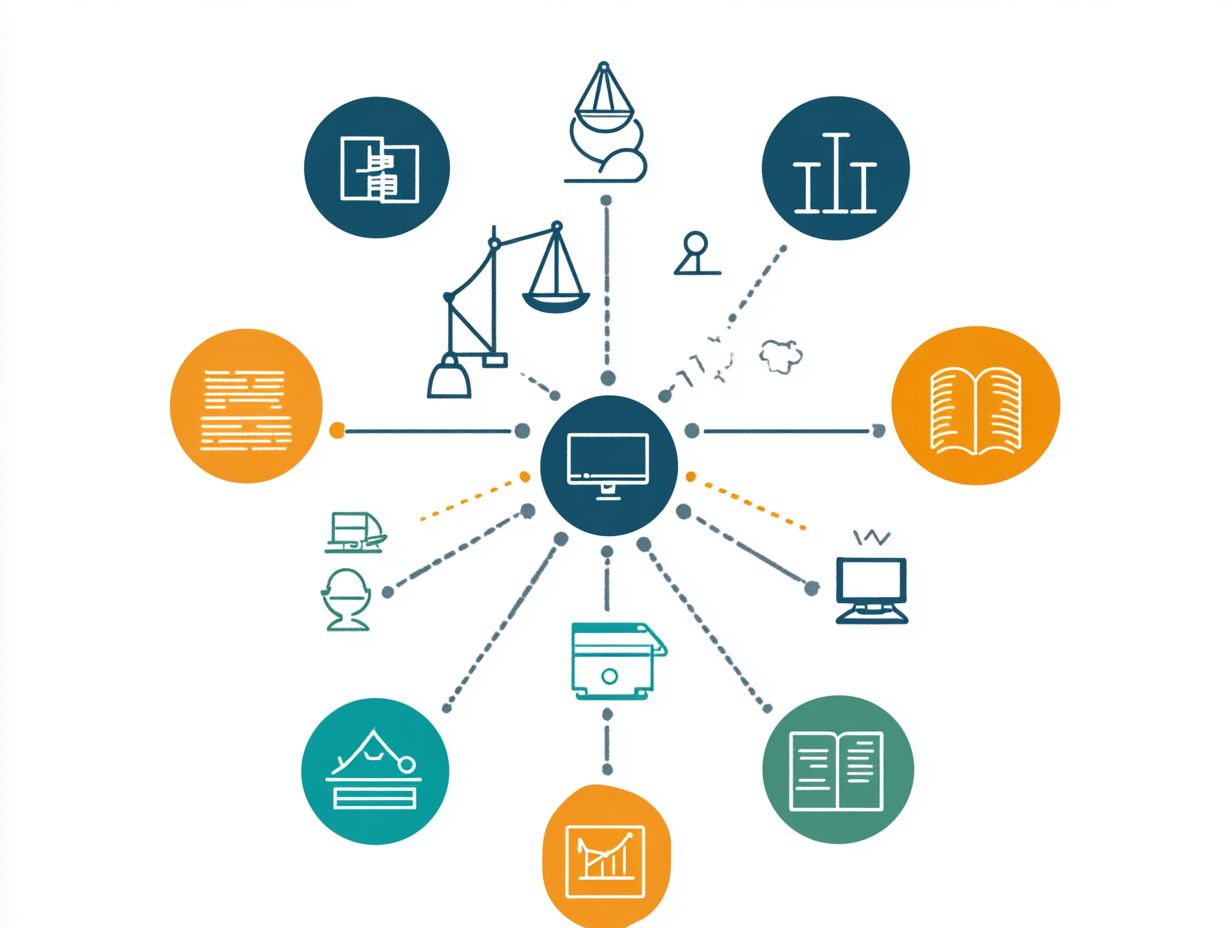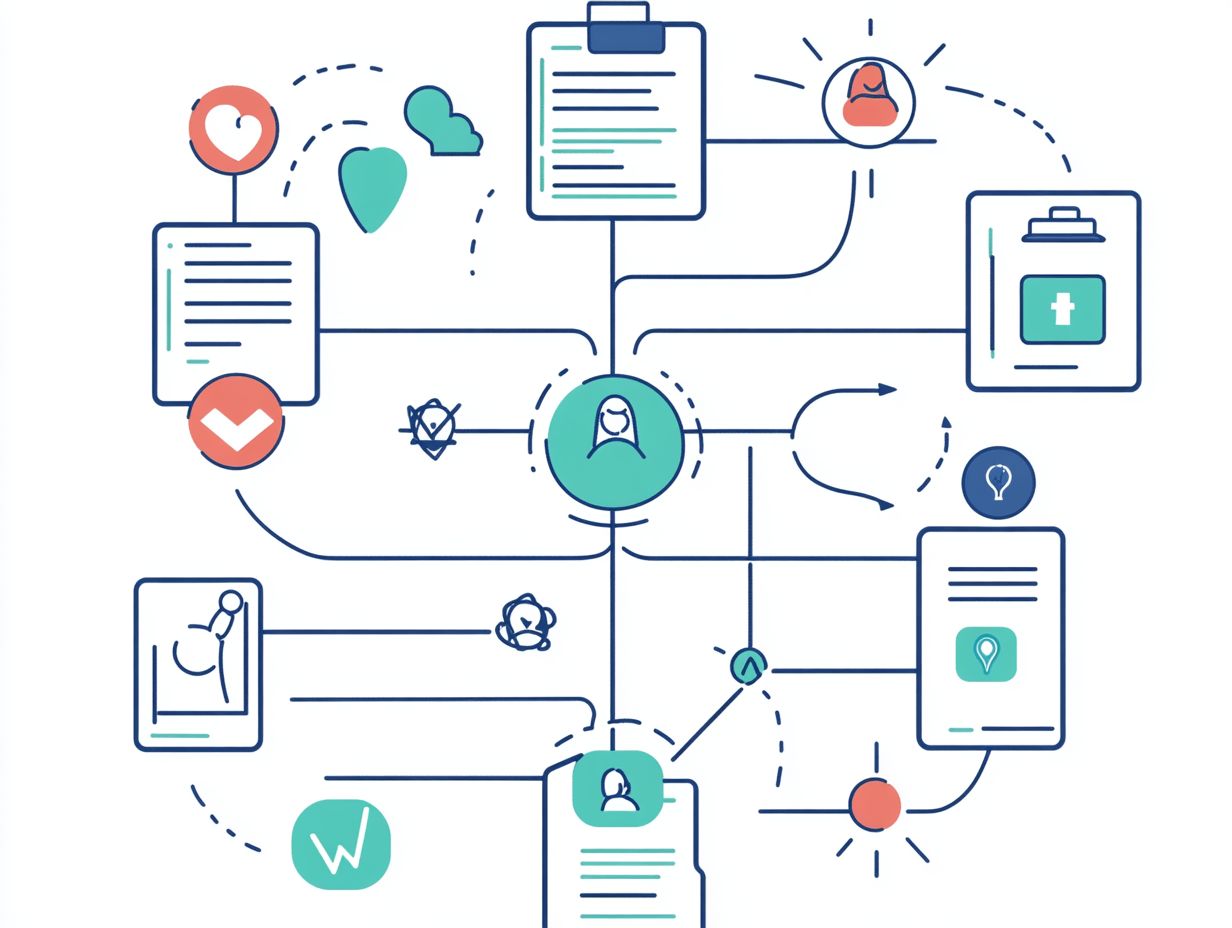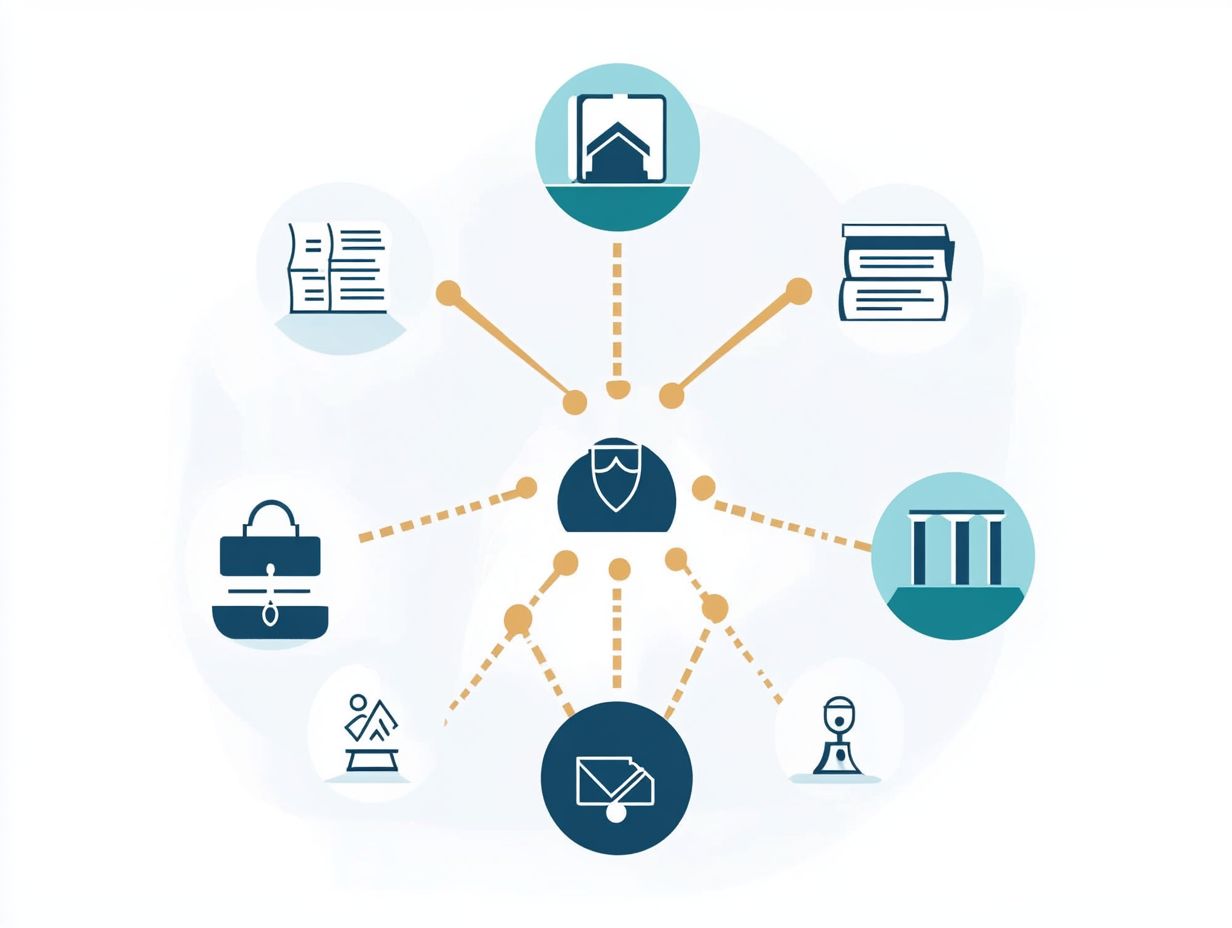5 Common Claim Types and Their Challenges
When you encounter adversity, being aware of your rights can truly transform your experience.
This article delves into five prevalent types of claims: personal injury, property damage, medical malpractice, product liability, and employment discrimination. Each of these claims comes with its own distinct challenges.
You ll find a thorough breakdown of the legal requirements necessary for filing these claims. We also explore the common obstacles you might face when trying to prove them, potential defenses that could be raised, and the invaluable role a lawyer can play in guiding you through the process.
We also cover statutes of limitations and the possible outcomes you might anticipate. By understanding these critical elements, you equip yourself to navigate your situation with confidence and clarity.
Contents
- Key Takeaways:
- 1. Personal Injury Claims
- 2. Property Damage Claims
- 3. Medical Malpractice Claims
- 4. Product Liability Claims
- 5. Employment Discrimination Claims
- What Are the Legal Requirements for Filing a Claim?
- Frequently Asked Questions
- What are the 5 common claim types and their challenges?
- What are the challenges of personal injury claims?
- How do property damage claims pose challenges?
- What challenges can arise in auto accident claims?
- What are the difficulties of workers’ compensation claims?
- What challenges are involved in insurance claims?
Key Takeaways:

Personal injury claims involve physical or emotional harm and require proof of negligence or intentional harm. Challenges include gathering evidence and proving causation.
Property damage claims involve harm to physical property and require proof of negligence or intentional harm. Challenges include determining value and proving causation.
Medical malpractice claims involve harm caused by a healthcare provider and require proof of negligence or failure to meet the standard of care. Challenges include expert testimony and proving causation.
1. Personal Injury Claims
Personal injury claims arise from incidents where individuals suffer harm due to someone else’s negligence. These claims encompass a range of legal claims, including economic damages, emotional distress, and even potential punitive damages.
You must navigate the complexities of insurance claims and legal processes with care to protect your rights. These claims can originate from situations such as:
- Car accidents
- Slip-and-fall events
- Medical malpractice
- Product liability cases
Each of these scenarios requires a thorough understanding of the specific legal nuances at play. Insurance companies play a crucial role in this process; they assess the legitimacy and value of the claims presented. Documented evidence like medical records, witness statements, and photographs becomes invaluable in building a compelling case.
As a claimant, you likely expect swift resolutions. Modern systems like Guidewire Claims Center enhance the efficiency of the claims cycle, ensuring that both insurers and claimants can track progress throughout the process.
2. Property Damage Claims
Property damage claims encompass the loss or damage of physical assets due to various incidents. Meticulous claims management is necessary to ensure you receive fair compensation and resolution from your insurance company.
Common causes of such damage include natural disasters like floods and hurricanes, as well as human-made events such as fires, vandalism, or accidents.
It’s essential to document your losses accurately, as this detailed evidence plays a significant role in determining the outcome of your claim.
Effective claims processing streamlines your resolution experience while elevating customer service standards. This fosters trust and satisfaction in your interactions.
A swift and fair handling of claims can significantly reduce complaints and nurture a positive relationship between you and your insurance provider.
3. Medical Malpractice Claims
Medical malpractice claims arise when healthcare providers fail to uphold the standard of care, resulting in injuries that deserve compensation. You must navigate the claims processing landscape with both precision and integrity.
These cases can encompass various scenarios, including surgical errors, misdiagnoses, medication mistakes, and neglectful treatment. Each situation highlights the vital role healthcare providers play in ensuring patient safety and adhering to established medical protocols.
As these professionals become increasingly accountable for their actions, the importance of fraud detection mechanisms rises significantly. These systems work to prevent abuses within the system.
By implementing robust verification processes, you not only shield patients from potential fraud but also enhance the overall integrity of medical claims processing. This approach fosters a more trustworthy healthcare environment, improving practices and outcomes for everyone involved.
4. Product Liability Claims

Product liability claims occur when consumers are harmed by defective products. It s essential to implement efficient claims management systems that address customer feedback and ensure timely compensation.
These claims can take several forms, such as design defects, manufacturing defects, or inadequate warnings. In these situations, insurance companies play a crucial role, evaluating claims and determining liability while working closely with affected parties to find resolutions.
Using tools like Guidewire Claims Center can significantly streamline your process. These innovative features enhance communication, expedite investigations, and provide real-time updates.
By automating workflows and simplifying case management, these platforms ensure that the claims process is both efficient and transparent, benefiting both consumers and insurers.
5. Employment Discrimination Claims
Employment discrimination claims arise when individuals face unfair treatment in the workplace due to protected characteristics. To resolve these claims effectively, it s important to understand the claims processing and the rules involved.
These claims can cover various issues, including harassment, wrongful termination, and unequal pay. Organizations must navigate complex legal frameworks to ensure fairness and justice for all employees.
Successful claims management is vital, especially concerning employee training. Robust training programs inform staff about their rights and foster an inclusive workplace.
Following the rules helps avoid legal issues and creates a better workplace for everyone. This enhances employee morale and productivity while aligning with established legal standards.
What Are the Legal Requirements for Filing a Claim?
Filing a claim involves navigating specific legal requirements that vary by jurisdiction and claim type. Understanding the claims process is key to managing these complexities effectively and safeguarding sensitive data.
You ll need essential legal documents, including claim forms, supporting evidence, and possibly witness statements, to establish the validity of your claim. Timelines are critical; each jurisdiction has its own deadlines for submissions and responses, which you must follow closely to avoid denial.
Ensuring compliance with the rules is vital, as it protects your rights and the integrity of the claims process. Utilizing claims management systems can help streamline your efforts, providing tools to track progress, organize documents, and maintain communication among all parties.
This approach not only enhances your efficiency but also improves the effectiveness of filing a claim.
What Are the Common Challenges in Proving These Types of Claims?
Proving various types of claims often presents common challenges. You need robust claims documentation, effective fraud detection measures, and an ability to address customer complaints that may arise during the process.
These challenges are especially pronounced in personal injury and medical malpractice cases, where detailed evidence and precise timelines are critical for a successful resolution.
You might struggle to gather vital documentation, such as medical records or witness statements, leading to delays in evaluation and approval stages. The emotional toll of navigating these claims can lead to frustrations, further exacerbating customer dissatisfaction.
By implementing streamlined claims processing systems, insurance companies can alleviate these bottlenecks. This approach not only facilitates quicker resolutions but also nurtures better relationships with claimants, ultimately enhancing overall trust in the claims process.
Ready to streamline your claims process? Start implementing these strategies today!
What Are the Possible Defenses Against These Types of Claims?

It’s important to know the defenses against different claims. This knowledge helps both claimants and defendants. Familiarizing yourself with arguments related to negligence and laws concerning wrongful acts that cause harm can shape your approach to processing claims.
By recognizing these defenses, you can better prepare for personal injury and employment discrimination cases. For instance, a defendant might argue that your injuries were pre-existing or not directly linked to the incident, which could lessen their liability.
In employment discrimination cases, defenses might include the assertion that the employer had legitimate reasons for actions like layoffs or terminations, unrelated to any discriminatory practices.
Ultimately, the effectiveness of these defenses can significantly affect how claims are managed and resolved, often guiding the process toward negotiations or litigation.
Unlock Your Claim’s Potential with a Lawyer
A competent lawyer plays a vital role in navigating claims management. They offer expertise in claims processing, ensuring regulatory compliance, and advocating for fair compensation on your behalf.
With their extensive knowledge of the legal landscape, they help you interpret complex insurance policies, allowing you to fully understand your rights and options. By diving deep into the specifics of your case, these legal professionals excel at identifying potential pitfalls that could jeopardize your claim.
They act as your trusted liaison with insurance companies, enhancing your experience by streamlining communications and ensuring you are treated fairly throughout the claims process. This advocacy not only brings you peace of mind but also maximizes your chances of achieving a favorable outcome.
What Are the Statutes of Limitations for These Types of Claims?
Statutes of limitations define the critical timeframes within which you must file your claims. These timeframes are pivotal legal requirements that influence claims processing and can vary widely depending on the type of claim and jurisdiction involved.
Understanding these timelines is crucial if you are seeking justice or compensation. Missing the deadline can forfeit your right to pursue a claim entirely.
For example, the timeframe for filing personal injury lawsuits is often much shorter than that for contract disputes. This underscores the importance of being keenly aware of the specifics that pertain to your situation.
Seeking legal guidance can be invaluable in navigating these complexities, ensuring that all documentation is in order and timelines are met. It can also provide clarity on how various elements, like claim types and state laws, might affect your case.
Timely processing boosts your chances of a favorable outcome and protects your rights as a claimant.
What Are the Potential Outcomes of These Types of Claims?
The potential outcomes of various claims can profoundly impact your life. They range from significant compensation for economic damages and emotional distress to the very real risk of denied claims.
These resolutions are not just fundamental for your financial stability; they also play a vital role in your emotional recovery process.
When navigating personal injury cases, you ll often find yourself engaged in intricate negotiations with insurance companies or enduring lengthy litigation.
It’s crucial to understand that the quality of claims processing can either fast-track your access to the funds you need or subject you to frustrating delays.
Efficient processing marked by clear communication and prompt decision-making can greatly enhance your chances of achieving a favorable outcome. In contrast, poor practices may lead to disappointing settlements or the risk of your claims being dropped altogether.
Frequently Asked Questions

Got questions? Here are some common queries to help guide you!
What are the 5 common claim types and their challenges?
Five common claim types include personal injury, property damage, auto accidents, workers’ compensation, and insurance claims.
Each claim type presents unique hurdles that can make securing the compensation you deserve challenging.
What are the challenges of personal injury claims?
Proving fault and the severity of injuries requires strong evidence and paperwork.
Negotiating with insurance companies can also be tough, especially when dealing with a legal team.
How do property damage claims pose challenges?
Determining the value of damaged property can be tricky.
Disputes may arise over who is responsible for the damage and how much compensation is fair.
What challenges can arise in auto accident claims?
Auto accident claims often involve complex fault issues and require solid evidence.
Insurance companies might downplay injuries or offer low settlements, making negotiations difficult.
What are the difficulties of workers’ compensation claims?
Workers’ compensation claims are complicated by various laws and regulations.
Proving that an injury is work-related and getting fair compensation for lost wages can also be a struggle.
What challenges are involved in insurance claims?
Insurance claims often involve a lot of paperwork and documentation.
Understanding policy terms and coverage, along with disputes over compensation amounts, can add to the frustration.


